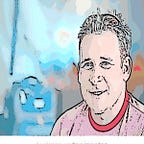Acting Lessons from Sir John Gielgud
Pillars for the actor to remember
I have already discussed some of the lessons passed down to me about Sir (Lord) Laurence Olivier. If you have read any of my other articles, you will know that I have been lucky enough to have been mentored by many giants of the American, British, Canadian, and Irish theatre. I am truly blessed. Although I say I am lucky, it has also been very strategic. Since theatre school, I have strived to work with and tap into the minds of the top actors and directors in my profession. I have always believed in apprenticeship and knew the best way to learn was by learning the lessons hands-on. Those lessons are passed down from great theatre artists to the next generation and so forth. As I learned, I swore to pass this same knowledge down. It is my duty to keep this theatre mantle going as long as I am alive.
My next few lessons come from the great English actor, Sir John Gielgud. Along with Sir Laurence and Ralph Richardson, Gielgud was widely thought of as being one of the great knights of the 20th century. My mentor, Robin Phillips, worked with Gielgud at the Chichester and then again in Albee’s Tiny Alice with Irene Worth. In my days with Robin, I would ask him regularly about his mentors and the lessons he learned from working with the great actors. These few lessons come through Robin about his time with Sir John. Robin, rest in peace.
The first big lesson Robin taught me was that Sir John would regularly comment on the importance of complete relaxation as an actor. Robin said Sir John’s sense of ease was extraordinary. Complete relaxation opens you up to receiving information from your director and allows your body to go anywhere you want it to. It also gives you an incredible range vocally and gives you the stamina to be able to go where you need to go emotionally and to get through the long, great plays. Relaxation is the secret to all good acting.
The second great lesson is that modern dialogue needs to be given even more colour and tone than verse. Shakespeare gives you an incredible range in his verse. Modern plays and TV scripts can be monotonous (think commercials!). This is not a comment on the quality of modern plays. Modern plays represent us as who we are today. They represent everyday talk, and this is not always dramatic talk. It is certainly not poetry like verse. It doesn’t have rhyming couplets and was not written through the lens of sound and sense that Shakespeare was consumed by (Now is the Winter of our Discontent made Glorious Summer by this Son of York). Hear those S’s? Not by accident. One of your most powerful tools as an actor is your vocal instrument. How does your instrument play and lift modern language off the page to keep the audience’s ears perked?
Three. The dramatic truth is the most important thing to find in a text. This is crucial to learning as an actor. As one of my other directing mentors would say, “Where is the drama?” You will be of the utmost value to your director if you know how to extract this drama. How do you build towards it? How do you ‘flag pole’ it for an audience? How do you shape the scene so an audience can easily follow you? Crystal clear storytelling that has the audience on the edge of their seat.
Four is precision. When an actor discovers something in rehearsal with their director, they must be able to repeat it over and over. The trick is to do it with the same freshness all the time. You must be able to do it technically, using images, emphasis, and timing. Great actors make every moment, every performance, seem like the first time they have done it. Complete honesty and believability for the audience.
Lastly, the actor is the only one that can contribute to the life of the play. You have probably heard something that sounds similar from the great director, Peter Brook, in his line about what you need for an act of theatre to happen. The actor brings the reality of the situation and the effect it has on the audience to life. According to Sir John, the actor needed to be considered first over all else. After all, once the rest of the team is gone, it is the actor’s sole responsibility to honour the work created and to ignite that spark with an audience. The actor must always strive to be better and clearer for the audience. The director must help them and then trust them.
We are blessed to have Sir John’s many performances on film. I encourage you to watch as many of them as possible. By just watching him, I have learned countless other lessons about acting by just watching him. This applies to watching all great actors. Dissecting their performance can teach you a great deal about your craft. In conclusion, I leave you with a quote from Sir John himself:
“One mustn’t allow acting to be like a stock broker — you must not take it just as a means of earning a living, to go down every day to do a job of work. The big thing is to combine punctuality, efficiency, good nature, obedience, intelligence, and concentration with an unawareness of what is going to happen next, thus keeping yourself available for excitement.”
— Sir John Gielgud.
